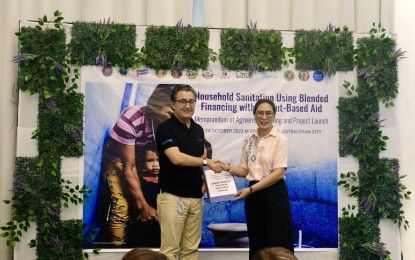In this age where most places are adapting to modernization and progress, it is unfortunate to think that there are still several families in Samar being left behind. They have no access even to basic sanitary facilities. Though no exact number was given, the DOH Information System recorded that only about 78.54 percent of households in Samar province had access to basic sanitation facilities in the year 2022.
Due to this, Samar, which was picked as one of the universal healthcare law advance implementation sites, was chosen as the beneficiary for the affordable “climate-resilient” toilets due to its high prevalence of sanitation-related diseases like diarrhea.
In partnership with the United Nations Children’s Fund (UNICEF), the provincial government identified a total of 150 families from the towns of Basey, Jiabong, and Paranas.
“Our province is highly vulnerable to experiencing adverse weather conditions, and having climate-resilient sanitation is one of the steps we’re taking to mitigate the risks and shocks associated with climate change,” Samar Governor Sharee Ann Tan said.
The beneficiaries were chosen due to the lack of existing toilets, owning a lot not located in a danger zone area, being willing to take out a loan for the construction of the toilet, and passing the eligibility criteria set by the microfinance institutions based on the household’s capacity to pay the loan.
A community effort
The said project will be implemented under two schemes – output-based aid and blended financing. This means that under the recently signed memorandum of agreement, the provincial government, including the local governments where the beneficiaries are located, will shoulder 85 percent of the cost in the form of a P45,000 grant per toilet. The remaining 15 percent of the toilet cost will be paid by the households to microfinance institutions in 12 monthly installments. The microfinance institutions include ASA Philippines, LifeBank Philippines, and Negros Women for Tomorrow Foundation which would finance the total upfront cost for selected households.
Each of the climate-resilient toilets costs P53,000 and features a two-chamber septic tank and a leach pit to prevent contaminating groundwater; roofing with a GI sheet protected by a parapet wall to prevent strong winds from getting inside the structure; a flooring raised above the ground to prevent floodwater; and an air vent to ensure proper air circulation.
With its construction, climate-resilient toilets that contain fecal matter could prevent contamination of groundwater and the environment, especially during disasters, which can lead to water-borne diseases. As of the recent data of the Department of Health Eastern Visayas, 142 barangays of the Samar province are already considered endemic for schistosomiasis.
If more households are able to afford the said project, this may help alleviate the further spread of diseases and infections through contaminated water.
CAPTION:
AFFORDABLE TOILET. UNICEF Philippines Chief of Water, Sanitation and Hygiene Carlos Vasquez (left) and Samar Governor Sharee Ann Tan at the signing of an agreement with microfinance institutions, in Catbalogan City on Wednesday (Oct. 25, 2023). The agreement paved the way to make climate-resilient toilets affordable to 150 extremely poor families in the province. (Photo courtesy of Samar Public Information Office)
#OpinYon8 #OY8 #ClimateResilientToilets #Samar #DOH #Climate #UNICEF #ShareeAnnTan #OpinYon #WeTakeAStand
